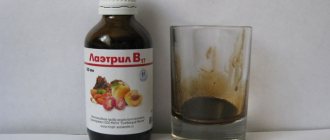What is taurine for?
Taurine is a biochemical compound that has beneficial and harmful properties. In the human body it is synthesized from an amino acid called cysteine to participate in the metabolic process. It is believed that taurine is an independent amino acid containing a high percentage of sulfur, which does not contain a carboxyl group.
It is produced in small doses by liver hepatocytes, so it is found in the greatest quantities in bile and the organs of the digestive tract. Taurine is used as an active substance for the production of medications in the field of ophthalmology, cardiology, neurology, and gastroenterology.
Included in artificial formulas for feeding infants. Widely used in the food industry as an additive in energy drinks, sports nutrition products, juices, and pet food.
Dysbacteriosis
Taurine is actively used as the main component of drugs for the treatment of the following diseases:
- dysbacteriosis and disorders of lipid, energy and protein metabolism;
- diabetes mellitus of all types;
- neurological disorders, tics, neuroses, depression, depressive states;
- rehabilitation period after an open or closed traumatic brain injury or brain surgery;
- acute or chronic cholecystitis;
- epilepsy (acts as an anticonvulsant, reduces the frequency of epileptic seizures);
- detachment and other processes leading to damage to the retina;
- cataract;
- corneal dystrophy;
- hereditary taperetinal degeneration of the eyeball;
- mechanical and radiation injuries of the organ of vision;
- consequences of myocardial infarction;
- bradycardia;
- tachycardia;
- angina pectoris;
- arrhythmia.
Quite often, taurine is included in therapeutic regimens and complexes, acting as an auxiliary substance to enhance the medicinal properties of basic medications. Indicated for use by men and women who suffer from a deficiency of taurocholic or taurodeoxycholic acids.
What is taurine?
Not everyone knows what taurine is. This is an amino acid that is necessary for the human body. Thanks to it, cell restoration and growth occurs. This biologically active substance is designed to be responsible for processes such as lipid metabolism and transmission of nerve signals. It can be synthesized in the body on the basis of sulfur-containing amino acids - cysteine and methionine.
The main difference between taurine is its ability to be present in tissues in a free form. The highest concentration of the substance is in:
- heart muscle;
- spinal cord and brain;
- kidneys;
- retina of the eye;
- skeletal muscles.
There is no doubt about the benefits of this active substance. Taurine is an amino acid that is perfectly soluble in liquid and can restore the normal functioning of almost every organ. A deficiency of this component can be dangerous to health, as a result of which mental activity will suffer, metabolism will be disrupted, and even strength indicators will decrease. This amino acid is rich in vital elements such as potassium, sodium and calcium.
Composition of Taurine
Taurine (benefit and harm to humans lies in the chemical properties of the substance) is synthesized in the human body during the enzymatic oxidation of hypotaurine.
Taurine Formula
Chemical composition of taurine:
- cysteine;
- cysteine dioxygenase;
- cysteine sulfinic acid.
The final stage in the process of biochemical formation of taurine is the decarboxylation of cysteine sulfinic acid into the substance hypotaurine, which, under the oxidative action of enzymes, is transformed into taurine. The process of amino acid formation itself occurs in the liver, and then becomes part of bile acids, acting as a surfactant for emulsifying fats in the intestinal cavity.
What medications contain Taurine?
Taurine acts as an active component of medications that restore the normal functioning of the heart muscle, blood vessels, liver, brain, gallbladder and gastrointestinal tract. The table below lists medications containing the substance taurine, as well as their detailed description and pharmacological properties.
| Name of the drug | Characteristic |
| Dibikor | Improves metabolic processes in heart tissue, improves blood circulation in blood vessels, while reducing the severity of cytolysis. The drug prevents congestion in the vessels of the systemic and pulmonary circulation. Taurine reduces the intoxication effect in patients with signs of overdose of cardiac glycosides. After taking 500 mg of the drug, 15-20 minutes later. taurine is found in venous blood. The maximum concentration of the amino acid is observed after 1.5 hours. It is completely excreted by the kidneys one day after taking the medicine. For patients suffering from impaired blood microcirculation, Dibikor is prescribed for 6 months. and more. The average cost of a medicine is 710 rubles. |
| Taufon | Contains the natural amino acid taurine, which stimulates regeneration and reparative processes in diseases of the organ of vision such as retinal detachment, corneal dystrophy, and metabolic disorders in the tissues of the eyeball. Available in the form of ophthalmic drops, which are applied 2-3 times directly to the mucous membrane of the organ of vision. A distinctive feature of these eye drops is that they are not absorbed into the bloodstream, but act exclusively at the local level, restoring only the organ of vision. The cost of the bottle is 110 rubles. |
| Tautonus | 1 tablet of this drug contains at least 500 mg of taurine. Prescribed for patients with degenerative retinal damage, severe myopia, corneal degeneration, cataracts, and diabetic retinopathy. Improves the well-being of patients with heart failure, hypertension, epilepsy, diabetes, stones and fibrosis in the gallbladder. |
The above taurine-based drugs can be used as a medicine during the treatment and rehabilitation of people with alcohol or drug addiction. Taurine-based drops are indicated for use as a restorative agent in the treatment of all diseases of the organ of vision.
Taurine: benefits and harm for humans
On many sites you can read about the substance as a super supplement without harmful qualities. Is it really?
How does taurine affect the body? Of course, each drug has a number of positive and negative properties. Incorrect dosage, use or ignoring the expiration date of the product can have a very detrimental effect on your health.
In general, the negative effect of taurine on the human body has not been fully studied. Despite the fact that some sources say that taurine is harmless in case of overdose, you need to be careful when using the substance.
The amino acid has a strong effect on some organs (the effect is ambiguous for the liver and bile ducts, heart and blood vessels), and the wrong approach to the drug leads to disruption of their functioning. During pregnancy and lactation, excess taurine can lead to serious disruptions in the functioning of a number of systems (cardiovascular, digestive).
Important! Before taking a taurine supplement, consult your doctor for advice and recommendations on taking the amino acid. The beneficial properties of a substance, if used incorrectly and in dosage, turn into harm.
Benefits of the substance
There is no doubt about the benefits of this substance for the body. It is highly soluble in liquid and is capable of restoring any tissues and organs. But its deficiency is also harmful to us, this manifests itself in deterioration in performance, lethargy, and metabolic disorders.
Without a doubt, taurine has many beneficial properties:
- Taurine and longevity are almost synonymous. This amino acid can slow down aging as it is an antioxidant. It also prevents the development of cancer.
- Maintains normal blood sugar levels, which is very important for people with diabetes.
- Restores blood pressure.
- Has a beneficial effect on the functioning of the heart muscle.
- Helps the body cope with stressful situations.
- Improves the functioning of the nervous system, the substance is good for the brain and mental activity.
- Restores the retina of the eye if it has been injured.
- Speeds up metabolism and generally has a beneficial effect on all body systems.
Taurine is also used for weight loss. Many have noticed the effectiveness of taurine in weight loss, for example, when taking amino acid supplements. It is important to note that this benefit has only been proven with proper nutrition and an active lifestyle.
Any weight loss product without these basic rules will not help achieve the desired result, and if it does, it will have a very detrimental effect on the health of all organs and systems.
iherb.com
Now Foods, Taurine, Double Strength, 1000 mg, 100 Veggie Caps
602 rub.
Buy now
View reviews
Taurine is also an effective diuretic that allows you to remove toxins and waste from the body, influence blood circulation, accelerate lipid metabolism, and relieve swelling.
Taurine is known for its anticonvulsant effect, so it is excellently used by specialists to relieve seizures in epilepsy and other related diseases. It is used as a remedy for anxiety and agitation.
The benefits of taurine for children are undeniable. Its presence in the baby’s body is very important, which is why the amino acid is contained in baby food and formulas. Taurine is actively used in children with Down syndrome and autism, as it is involved in magnesium metabolism. This amino acid is also successfully prescribed to children with attention deficit hyperactivity disorder. It regulates the balance of two main neurotransmitters (Glutamate-GABA) and is involved in glycine metabolism.
Taking tablets for VSD (vegetative-vascular dystonia) is marked by relief of the main symptoms. It is prescribed in combination with hawthorn and motherwort to strengthen blood vessels at the cellular level and maintain the heart in normal condition. Taking taurine is also prescribed when metabolism slows down, as a prevention of atherosclerosis.
Taurine restores damaged organs and tissues, so it is actively used as an adjuvant for closed skull injuries and other serious injuries.
The substance is available in the form of tablets and capsules. Its beneficial properties appear as a result of the interaction of other beneficial substances entering the body.
It is also used as a remedy for diabetics, as it has a positive effect on the organs that usually suffer in people with a similar disease (kidneys, nervous system, visual organs). The amino acid also regulates blood sugar levels. Taurine is also available in the form of eye drops (for example, for cataracts, which is observed in people with diabetes).
Indications and contraindications
It is also worth noting the indications and contraindications for taking taurine as a dietary supplement. It is recommended to take the substance if the following pathologies are detected:
- heart failure;
- intoxication of the body;
- obesity;
- diabetes mellitus type 1, 2;
- injuries of the cornea and retina;
- cardiovascular disorders;
- cataract;
- for the liver (some diseases).
When taking taurine, it is important to make sure that you do not have an intolerance to the amino acid or an allergy.
Contraindications for taking the substance:
- diseases of the liver and biliary tract;
- heart failure;
- pregnancy and lactation;
- exacerbation of ulcers;
- hypotension.
Taurine is harmful
Is taurine harmful to humans? Harm from taurine can occur if its dosage is incorrect, you have the above contraindications, individual intolerance to the substance, and if you ignore consultation with your doctor about taking this amino acid. Why is taurine dangerous if it is abused? Problems with bile secretion, heart muscle and blood pressure are observed . Taurine is also harmful for people who have problems with the gastrointestinal tract.
The fact is that the amino acid increases acidity in the stomach, and such diseases themselves are characterized by increased acidity, so taking taurine in this case is prohibited. Also, people suffering from peptic ulcers should avoid taking such supplements.
How is it harmful? Taurine is very popular for weight loss and among athletes, but the dosage must be observed, otherwise side effects and health problems cannot be avoided. It is very important to contact a specialist for examination and recommendations for his appointment. If it is abused, problems with the heart and brain may occur, decreased performance, lethargy, and decreased mental activity.
The amino acid also has several side effects if you do not follow the instructions for use correctly:
- There is an increase in insulin sensitivity;
- Hypoglycemia;
- Allergic reactions on the skin;
- Problems with the gastrointestinal tract.
Important! The combination of taurine with alcohol and caffeine is very harmful to the body. This contributes to rapid wear and tear of the cardiovascular system, metabolic disruptions, as well as disturbances in the transmission of nerve impulses and cleansing the blood of toxins.
From all of the above, we can conclude that taking taurine and other similar supplements should only be done under the supervision of a doctor, or at least after consultation with him.
What foods contain Taurine?
Taurine (benefit and harm to humans depends on the chemical properties of the substance) is an amino acid that is not only synthesized in liver tissue, but is also present in products of animal origin. However, this substance is practically not found in plant foods. The table below shows food products that contain this beneficial amino acid, and also indicates its value src=»https://healthperfect.ru/wp-content/uploads/2019/06/taurin-polza-i-vred-4. jpg" class="aligncenter" width="700″ height="472″[/img]
| Product name | Amount of taurine (mg per 100 g of food) |
| Turkey meat | 360 |
| Salted or dried tuna | 285 |
| Chicken meat | 170 |
| Oysters | 70 |
| Ham | 50 |
| Boiled beef | 38 |
| Cod | 32 |
| red fish | 130 |
| Rabbit | 38 |
| Shrimps | 22 |
| Beef liver | 15 |
| Low-fat yogurt | 3,3 |
| Beef heart | 65 |
| Carp | 9 |
| Iwasi herring | 1,5 |
| Cottage cheese | 1 |
| Cow's milk with fat content 3.5% | 2,5 |
| Mackerel | 6,5 |
| Pacific squid | 32 |
| Trepang | 7 |
Despite the fact that the highest concentration of taurine is found in poultry and animal meat, this amino acid is best absorbed by eating fish and seafood. For those who want to maintain a sufficient level of taurine in their body, it is recommended to eat mackerel, herring, shrimp, crabs, squid, and river fish at least 3 times a week.
Effects of Taurine on the body
Taurine (the benefits and harms for humans lie in the biochemical properties of this amino acid) takes an active part in metabolic processes, improves tissue regeneration, stimulates the activity of brain cells, and prevents metabolic disorders. Taurine has the following properties and effects on the internal organs and systems of the human body.
central nervous system
Taurine is useful for the activity of all centers of the brain. This substance is a neurotransmitter amino acid that improves memory and stimulates the process of transformation of new cells in the limbic part of the organ. The greatest influence is exerted on the areas of the brain that are responsible for mood and control psycho-emotional reactions.
People who are deficient in taurine are characterized by increased irritability and absent-mindedness.
The cardiovascular system
Taurine is a natural substance that acts as a preventative against heart failure and lowers blood pressure. Taurine improves general and local blood circulation, which prevents the formation of blood clots and congestion in the pelvic area, lower extremities, and stomachs of the brain.
Eyes
The greatest benefit of neurotransmitter acid is its effect on the organ of vision.
Regular intake of even small doses of taurine into the body stimulates metabolic processes in the organ of vision and restores cell membranes. Eye drops based on taurine help cure even the most complex diseases in the field of ophthalmology, prevent corneal dystrophy, and also restore its integrity after mechanical herbs and surgical intervention.
Endocrine system
Taurine is useful for patients with diabetes, when the patient's part of the pancreas, which is responsible for the synthesis of insulin, is completely or partially not functioning. The amino acid helps reduce blood glucose levels, normalizes energy metabolism, protects the kidneys, blood vessels, and vision from complications of diabetes.
What are the benefits of taurine?
The debate about the benefits and harms of this amino acid continues. But still, the benefits of taurine for the body are much greater. The beneficial properties of taurine are undeniable.
For the cardiovascular system
Taurine has the beneficial property of improving blood circulation and metabolism in the heart muscles. This benefits the general condition of the body and improves tone. In addition, scientists believe that taurine acts as an anti-catabolic, a drug that reduces the harm from homocysteine. In a state of stress, taurine acts as a protector for the heart muscles; it binds and blocks catecholamines, which cause overload of the heart muscle cells with calcium ions. It is known that taking taurine counteracts the necrotic processes of the cardiovascular system. It lowers blood pressure and has benefits in the form of strengthening the heart muscle. Its beneficial properties have a beneficial effect on heart rhythm and eliminate arrhythmia.
We recommend reading: Oily vitamin A (retinol) for the skin of the face and hands: application, reviews
For the nervous system
Taurine also benefits the nervous system. The fact is that it is a transport component, a neurotransmitter, a compound that ensures the transmission of impulses to the receptor. This beneficial property promotes the functioning of all human organs. This connection provides a timely impulse from the brain.
For visual acuity
With increasing age, the eyes become more sensitive to external influences (sun, light, dust, heat), scientists attribute this to degenerative changes and harm from taurine deficiency. If the taurine content in the tissues of the eye is present in normal quantities, then the visual apparatus is not subject to negative effects. Lack of amino acids provokes dystrophic and atrophic diseases of the organs of vision. Taurine benefits the eyes in the form of rejuvenation, regeneration and repair and normalizes energy balance and strengthens membranes in cells.
Important! Taurine is used for diabetes, the benefits and harms of such therapy are not comparable, the drug promotes intoxication and tissue regeneration, which is extremely necessary for this disease.
For the brain
Taurine has beneficial properties for the nervous system. Its protective property for the brain is especially useful. The amino acid is used for the treatment of neuroses, epilepsy, restlessness and agitation, hyperactivity and seizures. The level of taurine in a child’s brain is 4 times higher than that of an adult. The substance has the ability to help a child study better and be more focused. The benefit of the amino acid in the ability to restore the energy level of the nerve cell is such that both memory and attention improve (anger, irritability decrease), and sleep normalizes.
Applications of Taurine
The prescription of a tablet drug containing the active component - the amino acid taurine - should only be carried out by a specialized doctor after a preliminary examination of the patient. The dosage, procedure for use and duration of taking the medication are determined individually depending on the type of disease or any other pathological process, the elimination of which requires regular use of taurine.
For children under 18 years old
Formula-fed newborns receive taurine throughout the day while consuming formula. For children under 18 years of age, the average daily requirement for this amino acid is from 50 to 100 mg.
The benefits and harms of taurine
The indicated dosage is distributed into 2-3 doses over 20 minutes. before the meal. The minimum duration of the therapeutic course is 30 days. In addition, the child’s diet is saturated with foods rich in this amino acid.
To avoid overdose, the child must drink a sufficient amount of fluid (at least 1.5-2 liters per day, depending on the age and body weight of the baby). Taurine is highly soluble in water. If an excess amount of amino acid enters the child’s body, it will be quickly dissolved by water and excreted from the body along with urine.
For adults
An adult’s body, no less than a child’s, needs a sufficient supply of taurine. Men and women who are recommended to take this amino acid should drink 250 mg of taurine daily in the morning and evening. The substance is taken within 20-30 minutes. before the meal.
If the goal is to prevent the development of diseases of the cardiovascular, nervous and endocrine systems, and not to engage in systemic treatment of existing pathologies, then the indicated dosage can be reduced by 2 times. For adults suffering from diabetes, it is recommended to take 500 mg of taurine 2 times a day.
This dosage will not only saturate the body with the necessary amount of neurotransmitter acid, but will also help reduce the concentration of glucose in the blood and prevent damage to blood vessels, the organ of vision, kidneys and heart by sugar crystals. In this case, the order of taking taurine should be prescribed by an endocrinologist.
For pregnant
Most medications that contain taurine as the main active substance are prescribed to pregnant women only when absolutely necessary. This is due to the fact that clinical trials of the effects of medications on the body of the expectant mother and the developing fetus have not been conducted.
Prescribing amino acids to pregnant women is possible, but only under the personal responsibility of the attending physician. The patient must be in a hospital maternity or gynecological department. The average dosage ranges from 80-100 mg of taurine 2 times a day. Takes 20 minutes. before meals.
It is believed that the indicated dosage is safe for the child’s body developing in the womb. The drug should be taken only from the 3rd trimester of pregnancy if the benefits of the amino acid are greater than the potential harm. In the 1st and 2nd trimester, taking medications with taurine is excluded, since during this period the fetus is actively developing.
For the elderly
Elderly people take taurine-based drugs in the same order as all other adult patients. Chronic diseases of the kidneys, liver, heart muscle or blood vessels may limit the dosage. In this case, taking taurine can be prescribed not in a dosage of 250 mg, but 125 mg 2 times a day for 30 days.
At the same time, patients with chronic diseases of internal organs must visit their doctor every 10 days, be examined and take tests. This is necessary to exclude the possibility of a sudden deterioration in health, complications of current diseases of internal organs, as well as the negative impact of the side effects of excess taurine in the body.
Contraindications to taking Taurine
Taurine (benefit and harm to humans consists of the properties of the amino acid that it has on the body) - this substance is the end product of biochemical synthesis. Its deficiency leads to decreased functionality of the liver, gastrointestinal tract, gall bladder, and central nervous system. The development of chronic diseases, the development of which is caused by amino acid deficiency, cannot be ruled out.
At the same time, taurine is contraindicated for people who suffer from the following pathological conditions of internal organs:
- chronic or acute renal failure;
- cirrhosis of the liver or other diseases associated with the gradual breakdown of organ tissue;
- gallbladder necrosis;
- ulcerative lesion of the stomach with signs of internal bleeding, perforation, or in remission with obvious signs of scarring;
- intestinal obstruction;
- thrombophlebitis;
- varicose veins of the lower extremities with the presence of blood clots (taurine promotes dilation of blood vessels, which can lead to the detachment of a blood clot, its migration through the circulatory system with further blocking of the heart valves);
- duodenal ulcer;
- inflammatory diseases of the kidneys, or other pathologies that disrupt the excretory and filtration function of the organ.
Taurine is strictly contraindicated for simultaneous use with alcoholic beverages.
The combination of alcohol and this amino acid leads to excessive overexcitation of the central nervous system and the occurrence of atypical psycho-emotional reactions. Ultimately, this leads to exhaustion of the nervous system, depression, and the development of obsessive states. The combination of caffeine and taurine affects the human body in a similar way.
Taurine in bodybuilding
People who actively engage in sports also appreciate the beneficial properties of taurine:
- the substance has the ability to reduce harm from active training;
- benefits by increasing blood volume, which promotes the active supply of carbohydrates to muscle tissue and makes it possible to do more repetitions in subsequent approaches;
- reduces harm from stressful conditions; physical activity is stress for the body, which causes increased energy consumption and decreased immunity;
Important! Excessive exercise provokes an increased release of adrenaline, which lowers glycogen levels and burns fat. To maintain muscle mass, you need to take additional taurine. - Taurine also benefits the immune system in cells;
- increases the rate of glucose delivery to muscle tissue, providing benefits in the form of their recovery and accelerating their growth;
- the beneficial properties of taurine have a stabilizing effect on heart rhythm during prolonged aerobic exercise;
- prevents the appearance of muscle cramps during power loads and when lifting heavy weights;
- helps to recover after surgery or severe injuries.
Most athletes are not aware of the properties of taurine, but its benefits are enormous. This amino acid is useful for both professionals and beginners. It will help you get the desired result and not cause harm to the body.
We recommend reading: Vitamins for old dogs: rating of the best, reviews
Overdose
If the dosage of a drug containing taurine is not observed, excessive use of this substance can lead to pathological symptoms.
Signs of a neurotransmitter acid overdose are as follows:
- nausea, vomiting, which occurs both on a full and empty stomach (if a person vomits on an empty stomach, then bile may be released);
- loss of appetite, aversion to meat, fatty, fried foods, which goes away as the amino acid is removed from the body;
- an allergic reaction, which is manifested by the appearance of red spots, rashes, hives, covering certain areas or the entire surface of the body;
- overexcitation of the nervous system, hysterical laughter or sudden despondency, depression, absent-mindedness and inability to concentrate on one subject;
- rapid breathing, periodic attacks of arrhythmia;
- spasmodic pain in the central part of the abdominal cavity, where the intestines and stomach are located;
- a disorder of the digestive function, which can be expressed in the form of constipation, or in the form of prolonged diarrhea;
- a sharp drop in blood pressure to 90 to 60 tonometer units and below;
- dizziness, pain in the temporal, frontal or occipital part of the head;
- physical weakness, drowsiness, loss of strength.
An overdose of taurine entails the appearance of typical symptoms of intoxication of the body. It is possible to prevent further deterioration of well-being and quickly remove excess amino acids from the blood, but this will require taking immediate first aid measures.
They consist of performing the following actions:
- Give the patient 2 tbsp. l. sorbent drug Enterosgel or dissolve 1 sachet of Smecta, Atoxil powder.
- After taking a drug that partially eliminates the effect of intoxication, the patient must be put to bed.
- A patient poisoned with taurine takes a position on his side, with one arm under his head (this is necessary so that in the event of an attack of nausea, vomit does not enter the respiratory tract).
- Call emergency medical assistance.
Before the ambulance arrives, the patient should be given as much fluid as possible to drink to ensure the natural removal of taurine from the body. Upon arrival, doctors should inform them about what medications the patient took, when he was given sorbents and in what quantity.
Side effects
Taking medications containing taurine can cause the development of side effects.
In medical practice, their occurrence is rare, but can still manifest itself as follows:
- nausea, stool upset, vomiting;
- dizziness;
- complete or partial loss of appetite;
- unstable psycho-emotional state, expressed in nervous breakdowns, hysteria, depression;
- an allergic reaction to taurine, if a person has an individual intolerance to this substance;
- pain and heaviness from the right hypochondrium, which is caused by disruption of the liver or gallbladder tissue;
- drowsiness, drop in blood pressure and blood sugar.
If you follow the instructions of the drug and the doctor's recommendations, the likelihood of developing side effects is minimal. If they do occur, then you need to stop taking the amino acid and seek advice from your doctor.
What is taurine and what are its benefits?
Taurine is a sulfonic acid that is produced in some quantities by the body. Most often the substance is called an amino acid. During prolonged stress and physical activity, it is consumed more intensely.
Taurine is very important for humans for the following reasons:
- Takes part in the formation of eye tissue from infancy. Therefore, it is used during the treatment of injuries and diseases of the organs of vision. Prevents retinal damage.
- Able to have an anticonvulsant effect, helps during seizures.
- Has antioxidant properties. It is an excellent preventative against malignant neoplasms.
- Reduces blood sugar.
- It has a beneficial effect on the cardiovascular system and reduces the risk of developing atherosclerosis. Normalizes blood pressure.
- Participates in metabolic processes and the transfer of nutrients throughout the body. Normalizes the production of bile and adrenaline.
- Has a positive effect on the nervous system.
- Strengthens the immune system, increases resistance to viruses and neutralizes the effects of stress.
Normalizes heart rate during prolonged physical activity. Often used by athletes. You can find taurine in food.
In medicine, taurine is used to treat people with heart disease. It is even used for heart attacks. This is an excellent preventive measure for a huge number of diseases.
Combination of Taurine with other means
Taurine combines well with other medications, with the exception of those that contain ethyl alcohol, caffeine, and components that stimulate the activity of the central nervous system. In this case, it is possible to enhance the therapeutic effect of these medications.
This is detailed in the instructions that come with medications containing this amino acid. Taurine, like any other biochemical substance, can be beneficial or harmful to the human body.
It all depends on the dosage in which the amino acid is taken, whether it is done without permission or as prescribed by a doctor. The lack of a sufficient amount of taurine in the daily diet leads to exhaustion of the body and dysfunction of internal organs. An excess of a biochemical substance provokes intoxication.











